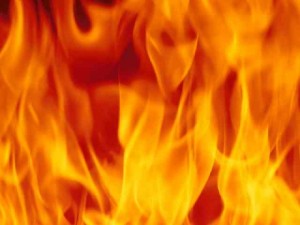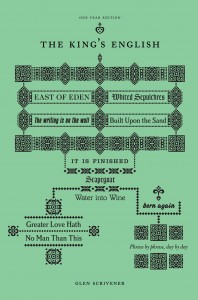Fire and Brimstone
These days the phrase “fire and brimstone” is more associated with a style of preaching than with the reality they preach. “Fire and brimstone” preaching is what our culture fears. Rarely does it occur to someone to fear fire and brimstone itself.
“Fire and brimstone” continually describes the judgement of God in the bible (see especially Revelation chapters 14, 19, 20 and 21). Especially in Revelation this judgement is intended for the devil and his angels. But, crucially, it befalls any who follow them (Matthew 25:41).
Both fire (e.g. Acts 2:3) and brimstone (Isaiah 30:33) are associated with the Spirit or Breath of God. That’s an intriguing link given what we will discover in our final point.
Certainly fire can be a description either of the love or wrath of God. It represents either the sunshine of His blessings or the blazing fury of His anger. So in a deep sense the judgement of God is the special presence of God to His enemies. God’s visitation is salvation to His friends and destruction to His foes.
And for Sodom and Gomorrah it is a salutary judgement to which the prophets, apostles and Jesus Himself refer continually.
So let’s think about a topic from which we usually shrink. Let’s examine this first mention of “fire and brimstone” because as we study the context of the LORD’s judgement we will learn much about His justice and mercy.
First let’s think about the justness of judgement.
The episode begins in Genesis 18 with the LORD’s visit to Abraham. He appears to Abraham along with two angels (Genesis 18:1,2; 19:1) and so we have here the Son of God, the pre-incarnate Christ. And in verse 20 He explains why He has come:
Because the cry of Sodom and Gomorrah is great, and because their sin is very grievous; I will go down now, and see whether they have done altogether according to the cry of it, which is come unto me; and if not, I will know. (Genesis 18:20-21)
There are offences that stink to high heaven. And that is a wonderful thing. In a world where concentration camp commandants can escape to South America and bounce their grandchildren on their knees, we long for justice. This episode reminds us that there is justice. Wickedness creates an outcry – an outcry that is heard and that moves a loving God.
Second let’s think about the divine reconnaissance.
This incident shows an extraordinary concern for first-hand knowledge. The LORD is anything but blasé about “fire and brimstone”. He condescends to an elaborate fact-finding mission. The kind of concern we see here would lead Him to take flesh in the fullness of time. Not just to view wickedness from the outside but to “know” it as its supreme Victim.
Third let’s think about Abraham’s intercession. From chapter 18 and verse 23 we read that Abraham “drew near”. That’s a lovely detail. The condescending LORD stoops down and His trusting friend draws near – and draws near to haggle.
Essentially Abraham asks “Will you judge these cities if there are 50 righteous folk in them?” Indeed the LORD would not. “What about 45? 40? 30? 20? 10? You wouldn’t sweep away the whole place if there were 10 righteous people would you?” The LORD promises not to.
The heart of Abraham’s plea is verse 24:
Shall not the Judge of all the earth do right?
This whole episode is quite breath-taking. It is astonishing that the LORD should enter into such haggling, should promise to remember mercy and, most of all, should submit to a standard of “right”. Isn’t He the LORD? Doesn’t He simply determine what is right?
The LORD’s stooping is not simply for information but it extends even to accountability – accountability to creatures who are “but dust and ashes.” (Genesis 18:27)
And again this stooping is extended in the Gospels when the LORD becomes not only an accountable Judge, but an accused Defendant!
Finally, let’s think about mediated judgement. Once Abraham has finished haggling, the LORD moves on to Sodom and in Genesis 19:24 He finally metes out judgement:
Then the LORD rained upon Sodom and upon Gomorrah brimstone and fire from the LORD out of heaven
Notice the two persons called “LORD” in this verse. There is the LORD on the earth who’s been speaking with Abraham, and there is “the LORD out of heaven.” The Son rains down judgement from the Father. As Jesus says in John 5:22, “The Father hath committed all judgment unto the Son.” It is Jesus who judges the world. It is Jesus who is in charge of the fire and the brimstone.
This, ultimately, is what gives us confidence that the Judge of all the earth will do right. We know that the One who judges is the One who’s been the judged. We know that He has climbed down from the throne and put Himself in the dock to receive the harshest sentence imaginable. On the cross He has proved Himself more willing to suffer the fire and brimstone than to dish it out.
These considerations won’t answer all our questions about judgement. But they point us in the direction of an answer. Whatever questions we have about judgement we can bring them to the cross and say “I trust this LORD to do what is right.”
Comments are closed.



